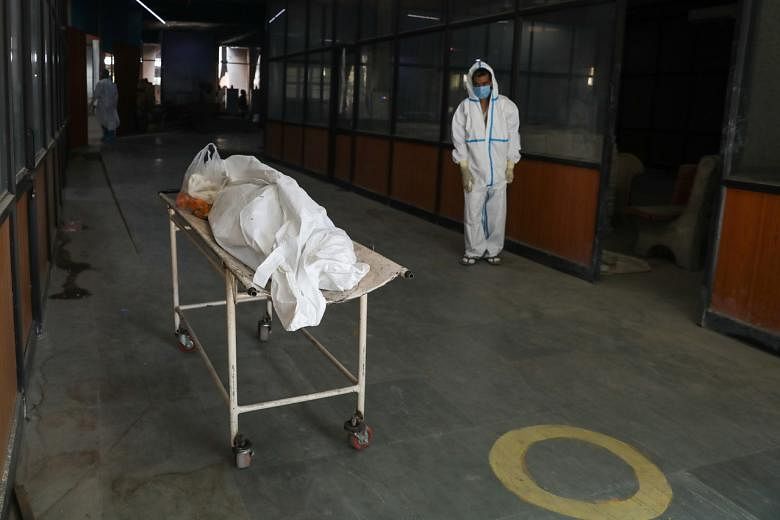NEW DELHI (BLOOMBERG) - India's crematoriums and burial grounds are working overtime to cope with the surging number of deaths from the country's escalating Covid-19 outbreak.
India is now the world's second worst-hit nation, having overtaken Brazil once again on Monday (April 12) with a sharp jump up in daily new infections over the last 10 days for a grand total of nearly 13.7 million cases.
On Tuesday, the country reported 161,736 new cases and 879 deaths, more than four times the daily average in January.
Local media has been filled with grim reports of melting furnaces at crematoriums running non-stop, bodies piling up and smoke from continuously burning flesh creating another health risk for locals.
Workers at six crematoriums across the country confirmed the scenes in phone interviews, saying they've seen Covid-19 deaths climbing.
"Earlier, 15 to 20 bodies were coming in a day and now around 80 to 100 bodies are coming daily," said Mr Kamlesh Sailor, the president of a trust operating a crematorium in Surat, a city in the industry-heavy western state of Gujarat.
Even after the crematorium doubled capacity when India's first virus wave struck last year and started operating 24 hours a day, families still need to wait at least two to three hours to cremate the bodies of their relatives, he added.
"We can't afford to have long queues of people at the crematorium, as that again increases the risk of spreading infection," Mr Sailor said.
"The situation is likely to worsen going ahead as hospitals across the city are filled to capacity."
The deluge of infections and deaths highlight just how unprepared Prime Minister Narendra Modi's administration has been to deal with the latest wave of the epidemic.
In the past few weeks, large crowds have gathered for election rallies in five states, festivals, and religious pilgrimages - indicating things could get even worse for the country and its crematoriums.
Even with the rise in deaths, experts say India is still under-reporting fatalities.
Death registration data was patchy even before the virus struck, with the vast majority - especially in rural villages - taking place at home and going undocumented.
For others that get reported, the cause of death listed is often anodyne - old age or heart attack.
Experts believe that only between 20 and 30 per cent of all deaths in India are properly medically certified.
Media footage of queues at hospitals, critical medicine shortages, and an exodus of migrant workers heading to rural villages in fear of another lockdown has been reminiscent of the strict shutdown roughly a year ago that gave rise to one of the worst humanitarian crises the region has seen in decades.
"There was a lull period in January and February with a much lower number of Covid deaths, but now in the last three weeks it is overflowing," said Ms Namrata Singh, chief executive officer at Antim Yatra, a private funeral service provider in Delhi and Mumbai.
In the national capital New Delhi, the largest burial ground and cremation centres reported an average of eight to nine Covid deaths a day, up from one or two a month ago.
They are preparing for more after the city on Monday reported a record high of over 11,000 new infections.
At Nigambodh Ghat, New Delhi's largest cremation ground on the banks of Yamuna river, the administration has "made provision to increase the number of wood pyres and have also planned for additional manpower", said Mr Jai Prakash, the mayor of North Delhi Municipal Corporation.
The High Court in Gujarat on Monday urged the state government to take quick measures to deal with the growing health crisis and asked for a report in two days.
The state's lawyer, Mr Kamal Trivedi, told the court that last week the government compelled some hospitals to set aside facilities for Covid treatment.
Over in Surat, which sits north of India's financial centre of Mumbai, Mr Sailor called on the government to "give death-related information truthfully".
"They should reveal both Covid and suspected Covid-related deaths, but that is not happening," he said.
"The true picture can actually benefit people as they will be aware and take more precautions."

